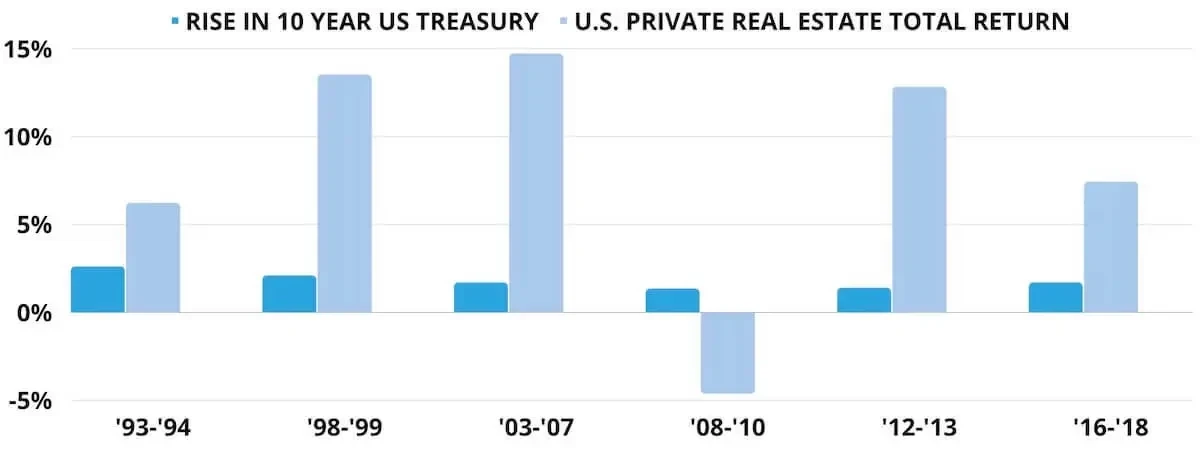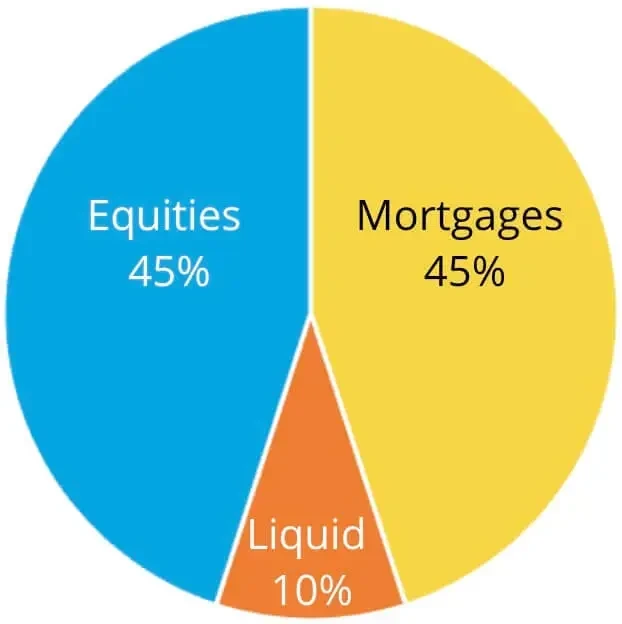Is Your Stock and Bond Portfolio Ready?
Alternative investments, like private real estate, continue to be added to traditional stock and bond portfolios. MJ REIT focuses on commercial real estate whose tenants operate in the state legal cannabis industry. Diversifying with private real estate has the potential to create a more efficient portfolio.

Income
Private commercial real estate has potential to deliver competitive income compared to public REIT’s and fixed income securities. By focusing on the state legal cannabis industry, there is potential to increase an already attractive level of income.

Diversification
Alternative investments like private commercial real estate can be complimentary to a traditional stock & bond portfolio. Private real estate may also serve as a hedge against inflation and rising interest rates. Rent increases and other factors can help real estate derived income outpace inflation.

Stability
Private commercial real estate has historically provided attractive risk-adjusted returns. Unlike public REITs which trade on an exchange, private REIT’s are not listed, resulting in lower volatility. Conversely, private real estate offers less liquidity than publicly traded securities.
Private Real Estate can make an Impact
Risk & Returns Over The Past 20 Years1


PAST PERFORMANCE DOES NOT GUARANTEE FUTURE RESULTS
1. Morningstar Direct, NCREIF. 20-year period ending December 31, 2021. Portfolios with and without private real estate are hypothetical and this is not a portfolio allocation recommendation. Appraisal-based valuations of private real estate may be subject to smoothing bias and may therefore reflect lower volatility than would the valuation of public entities traded on an exchange. Returns and Volatilities are presented on an annualized basis. Private real estate is represented by the NFI-ODCE index and reflects the returns of diversified, private core, open-end funds that invest in private real estate, including leverage and fund expenses, but excluding management and advisory fees. Returns net of management and advisory fees would be materially lower. The funds in the NFI-ODCE index typically employ lower risk investment strategies, utilize low leverage and generally represent equity ownership positions in stable U.S. operating properties diversified across regions and property types. It is not possible to invest directly in an index. Equities are represented by the total return of the S&P 500 Index, including dividends. Fixed Income is represented by the Bloomberg U.S. Aggregate. The S&P 500 Index and the Bloomberg U.S. Aggregate Bond Index are meant to illustrate general market performance.
2. The time periods above (1993-1994, 1998-1999, 2003-2007, 2012-2013, 2016-2018) constitute select episodes over the 25-year period from 1993 to 2018 when treasury yields increased by more than 135bps. U.S. Private Real Estate Return is represented by the NFI-ODCE index annualized return; annualized returns refer to specific time period plus one additional year. The NFI-ODCE reflects the returns of diversified, private core, open-end funds that invest in private real estate, including leverage and fund expenses but excluding management and advisory fees. Returns net of management and advisory fees would be materially lower. The funds in the NFI-ODCE index typically employ lower risk investment strategies, utilize low leverage and generally represent equity ownership positions in stable U.S. operating properties diversified across regions and property types. The annualized return for the NFI-ODCE for the time periods shown (1993- 2018) is 8.9%. An investment in MJ REIT is different from the NFI-ODCE. It is not possible to invest directly in an index. An investment in MJ REIT is not a direct investment in real estate, and has material differences from a direct investment in real estate, including those related to fees and expenses, liquidity and tax treatment. The rise in the 10-Yr U.S. Treasury Yield is represented by the peak and trough 10-Yr U.S. Treasury Yield during each timeframe presented.
MJ REIT’s target allocation will combine traditional first lien mortgages with sale leaseback transactions. For liquidity purposes a small allocation may be placed in marketable securities. Investments will only be made in state legal cannabis markets, which continue to expand.
Target Asset Allocation

State Legal Target Markets

Target Property Types
Sub-Managed by

- Multi-Generational history (Gould Investors L.P.) of commercial real estate investing since 1962
- Manage three cannabis-focused institutional private funds
- Gould Investors LP thematically entered cannabis industry in 2013
- Financed 58 properties across 10 states
- Gould Investors LP is a significant stockholder of two NYSE traded REITs (NYSE: BRT & OLP)
Fund Summary
-
Inception
August 2022
-
Structure
Regulation D 506(c)
-
Term
Perpetual Offering
-
Investors
Accredited Investors
-
Minimum Investment
$25,000
-
Management Fee
1.5%
-
Performance Participation
15% of the annual total return, subject to a 7% hurdle
-
Net Asset Value
Monthly
-
Distributions
Monthly
-
Subscriptions
Monthly
-
Tax Reporting
1099-DIV
-
Share Redemption Program
Shares held less than 12 months are redeemed at 95% of NAV. Monthly redemptions subject to 2% of aggregate NAV per month (measured using the aggregate NAV as of the end of the immediately preceding month) and 5% of aggregate NAV per calendar quarter (measured using the average aggregate NAVas of the end of the immediately proceeding three months.
Operational Partners
-
Auditor
Marcum LLC
-
Fund Administrator
Vistra USA LLC
-
Legal
Royer Cooper Cohen Braunfeld LLC
-
Valuation Services
Weaver and Tidwell, LLP
PAST PERFORMANCE DOES NOT GUARANTEE FUTURE RESULTS
All figures as of June 30, 2022 unless otherwise noted. This is neither an offer to sell nor a solicitation of an offer to buy the securities described herein, and must be read in conjunction with the PPM in order to understand fully all of the implications and risks of the offering to which this sales and advertising literature relates. A copy of the PPM must be made available to you in connection with this offering, and is available at www.MJ-REIT.com. The purchase and repurchase price for shares of MJ REIT’s shares will be based on NAV and will not be based on any public trading market. Because the valuation of MJ REIT’s investments is inherently subjective, the NAV of MJ REIT’s shares may not accurately reflect the actual price at which assets could be liquidated on any given day. Valuations and appraisals of real estate-related debt and investments are estimates of fair value and may not necessarily correspond to realizable value, which could adversely affect the value of an investment. There is no public trading market for our shares and repurchase of shares by us will likely be the only way to dispose of your shares. We are not obligated to repurchase any shares under our share repurchase plan and may choose to repurchase only some, or even none, of the shares that have been requested to be repurchased. In addition, repurchases will be subject to available liquidity and other significant restrictions. As a result, our shares should be considered as having only limited liquidity and at times may be illiquid. Distributions are not guaranteed and may be funded from sources other than cash flow from operations, including borrowings, offering proceeds, the sale of our assets and repayments of our real estate debt investments. We have no limits on the amounts we may fund from such sources. If we fail to qualify as a REIT and no relief provisions apply, our NAV and cash available for distribution to our investors could materially decrease. MJ REIT has no employees and is dependent on its adviser and sub-manager to conduct operations. MJ REIT’s adviser and sub-manager will face conflicts of interest as a result of, among other things, the obligation to allocate investment opportunities among MJ REIT and other investment vehicles, the allocation of time of their investment professionals and the substantial fees and expenses that MJ REIT will pay to its adviser and its affiliates. This is a “best efforts” offering. If MJ REIT is not able to raise a substantial amount of capital in the near term, its ability to achieve its investment objectives could be adversely affected. There are limits on the ownership and transferability of MJ REIT’s shares.